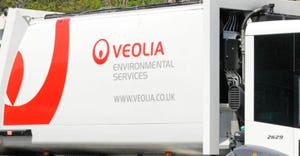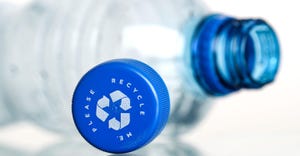What's All This Talk About Trash, Anyway?
March 1, 2001
Sarah Nichols Free-lance Writer Kansas City, Mo.
Talking trash means different things to different people, but to Eco Partners, Carmel, Ind., it means helping communities spread the word about their solid waste program.
In operation since 1993, the company produces Trash Talk!, a newsletter that targets upper-elementary school students. It serves as an outlet for clients such as solid waste managers to get their message out to the youngest citizens in their communities. The newsletters' quarterly topics include household hazardous waste, recycling, composting and America Recycles Day.
The tabloid-size, four-page, full color Trash Talk! uses soy-based inks on recycled-content newsprint. Pages one and four include customized articles for Eco Partners' clients, covering local recycling, composting, waste reduction, household hazardous waste programs and other community efforts. The inside pages are the same for each client — full of games, puzzles and different activities for kids.
After a 13-year teaching career and a five-year stint as the recycling coordinator for the city of Indianapolis, Beth Bugbee, president of Eco Partners, started the newsletter to fill a specific need.
“We try to take the skills kids need to know — science, math, language arts — and put it in the topic of waste reduction,” she says. “This makes it easy for teachers to integrate the recycling topic into their daily lesson plans, and it gives cities, counties and states an excellent outreach opportunity.”
Eco Partners also has created a free guide that offers teachers reuse ideas, extension activities and answer keys for each issue. And the results speak for themselves: Trash Talk! started out with seven subscribers, and now eight years later, is a tool for more than 59 clients.
Producing the issue is a relatively simple process. Bugbee and Vice President Elizabeth Roe fax clients a three-page questionnaire before each issue. They then use the answers to write customized articles. Each client has two opportunities to edit the material before the newsletter goes to press. And, Bugbee says, clients realize significant savings — 40 percent less than if they were to do this on their own. Why? Because they share a print run with several other subscribers, significantly decreasing the cost per piece. And they don't incur charges for outside artists, writers and layout teams, Bugbee says.
“For the service they do and what they charge, Trash Talk! is a very reasonable option,” says Deborah Wiggins, environmental control officer for the Carson City Environmental Health Department, Carson City, Nev. “It's a wonderful avenue for us to get into the classrooms and get kids thinking about recycling and composting.” Her department delivers Trash Talk! to every third and fourth grader in the city as part of the city's commitment to educate Carson City's citizens.
When Wiggins started using the newsletter four years ago, it was difficult to tell what affect it would have. Now she knows the value it brings. “Kids write letters to us about some of the articles, and they even write in with questions,” Wiggins says. “We always try to feature the child, their photo and the answer to their question in the next issue of Trash Talk!.”
For Holly Kendall, education coordinator and assistant director for six years for the Wabash County Solid Waste Management District, Wabash, Ind., Trash Talk! is just part of everyday life. “Trash Talk! was on the scene before I was,” she says. “We've been with it since the beginning. It's not the only educational tool we provide, but it's definitely our most popular. It really seems to stick in the kids' minds.”
For Kendall and her colleagues, the newsletter provides effective ways to spread the word about Wabash County's efforts. “It would be so labor intensive for us to do this on our own,” she says. “Even if we had the budget to produce something of this quality, and we don't, we have so many other things on our plate already that we couldn't do it.”
When Bugbee started Eco Partners Inc., she never saw herself producing newsletters exclusively. “At first, we were a consulting company, and then because of our clients, we gradually focused entirely on newsletters,” she says. Bugbee and Roe also produce One Man's Trash, a sister publication to Trash Talk! that serves the adult community. The format is much the same — a four-page, full color, tabloid-style quarterly — but the newsletter is inserted directly into the city newspaper for circulation to residents.
The idea is the same: Eco Partner's clients customize the outside pages with local information and the inside is consistent for everyone. But the adult newsletter covers other environmental issues, including water and air topics. Many clients use the newsletters as a way to reach all age groups in the community. And some clients, such as Kendall in Wabash County, distribute One Man's Trash to interested teachers at the local high school. “It's a very economical way to reach two very different audiences,” Bugbee says.
She also says she's been able to achieve client satisfaction for years by providing a product that her clients find useful and cost-effective. After all, the rates haven't changed since 1993.
To learn more about Trash Talk! and One Man's Trash, contact Eco Partners toll-free at (877) 312-9555, or visit www.trashtalk.com and www.onemanstrash.com.
You May Also Like


